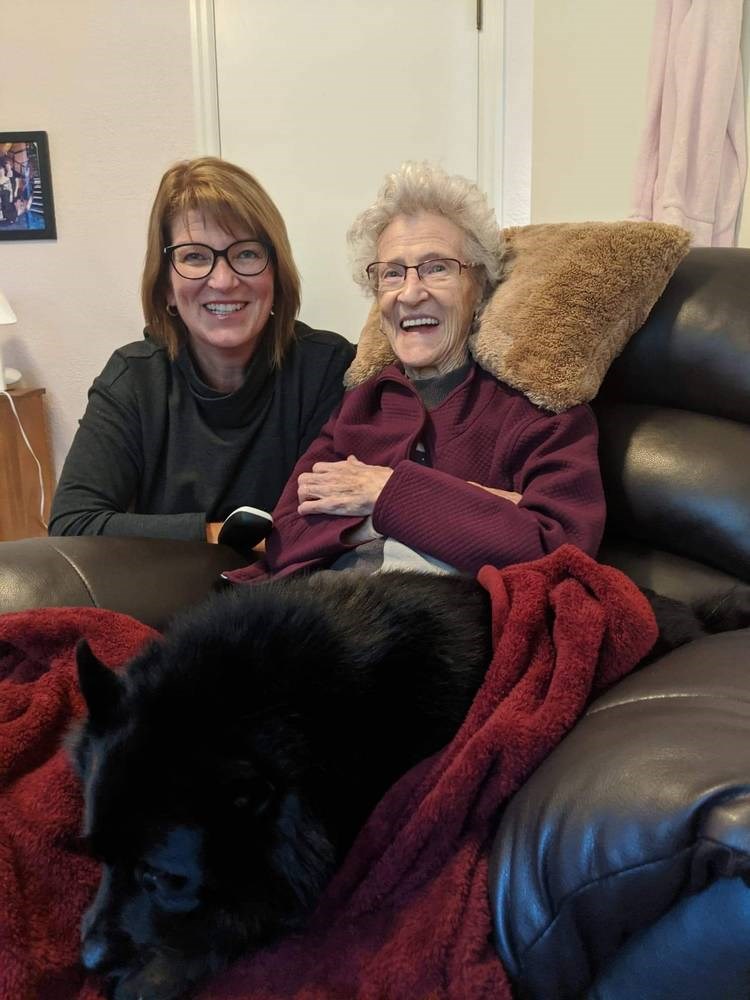A moment of silence for all those who have died in long-term care amid the pandemic will be held today during a rally in Victoria organized by families who want to be designated essential visitors to care for their loved ones in seniors homes.
Brenda Brophy, who removed her 100-year-old mother Dot Finnerty from a Victoria seniors home last week, said throughout the pandemic politicians have said the restrictions in long-term care “is the thing we hear about the most and our frustration is why is it the thing they talk about the least.”
The rally organized by Families For Change — Stories from Long Term Care, will take place on the front lawn of the B.C. legislature at 2 p.m. after a short walk from St. Ann’s Academy starting 15 minutes prior.
The minute of silence will recognize all the seniors in care who have died of other causes, alone or with limited visitors amid pandemic restrictions. The majority of the 233 deaths from COVID-19 in the province have been seniors in long-term care but during that same time, B.C. seniors advocate Isobel Mackenzie has estimated, 2,000 seniors have died of other causes.
Care homes have been targeted for restrictions on visiting because older people are particularly vulnerable to COVID-19.
Politicians have said the restrictions are not “forever” but in the life of some seniors in a care home, “it is forever,” said Brophy.
B.C. Health Minister Adrian Dix has said the pandemic is expected to be around at least another year.
“There are countless tragic stories,” said Brophy.
Those stories include families who say their loved ones have noticeably deteriorated physically and mentally without regular visits, some losing the will to live, some suspected of having had quicker deaths.
Long-term-care facilities have restricted visits to essential visitors since March 17 to protect vulnerable residents and minimize the spread of COVID-19.
The impact of the restrictions on seniors’ health has also been profound, said Mackenzie, who is conducting a survey on these experiences. The last day of that survey is Wednesday.
The B.C. Centre for Disease Control says health authorities and facility operators determine if a visit is essential. Essential visits include those paramount to the resident’s physical and mental well-being — lending assistance with feeding, mobility or personal care, for instance.
The restrictions on all “social” visits were eased June 30 to allow for one scheduled, designated visitor per resident but it was up to care facilities to determine the details. Anecdotally, that implementation has been inconsistent, said Mackenzie.
Dr. Bonnie Henry, provincial health officer, said on Monday it’s a challenging issue. “We do have guidance, it is being updated and revised.”
One challenge is having sufficient staff to support visits. Dix recently announced added funding for up to four positions per facility to aid visits.
“We want very much to increase the numbers of people that an individual can have visiting them,” said Henry.
Dot Finnerty fell several weeks ago, breaking ribs. Brophy, who has had requests to be designated an essential visitor rejected, was now allowed to be by her mother’s bedside for one hour daily to care for and feed her.
A week later, when her mother had much improved, that designation was removed, she said. Brophy returned to the status of a “social visitor.”
Guidelines for “social” visiting, updated by Island Health on Aug. 25, say care homes should “aim to allow at least one social visit per week per resident,” that “formal supervision of a visit is considered intrusive and there is no expectation or mandate for this practice” and that “the location for a visit can be a resident’s room, provided it is a single room.”
Touching is permitted if strict hand hygiene is followed.
“The final straw for me was I wanted the social visits to be in her room,” said Brophy, “and I was refused.”
Brophy said her mother would be forced to sit in a designated visiting area amongst others for a visit rather than being allowed to remain in her comfortable reclining chair in her single room.
“I was like, I’m done, I’m so done,” said Brophy.
Rally speakers include Elaine Gallagher, the former director of the UVic Centre of Aging. The Raging Grannies will also be part of the rally.
“We’re rallying to bring attention to the deterioration and decline of our loved ones in care and asking policy makers to make the changes that will allow essential caregiver access again so that we can provide the care that we could prior to the pandemic,” said Brophy.
Brophy said B.C. is the most restrictive province.
Henry said she believes the province needs to be cautious. “We’ve seen in Quebec and Ontario, in particular, that they did expand [visitation] quite a lot and they’re now starting to see larger outbreaks in their care homes,” said Henry. “It is a very challenging thing for us to find that balance. We will continue to modify and look at how we can support families to be with their loved ones in care homes.”



